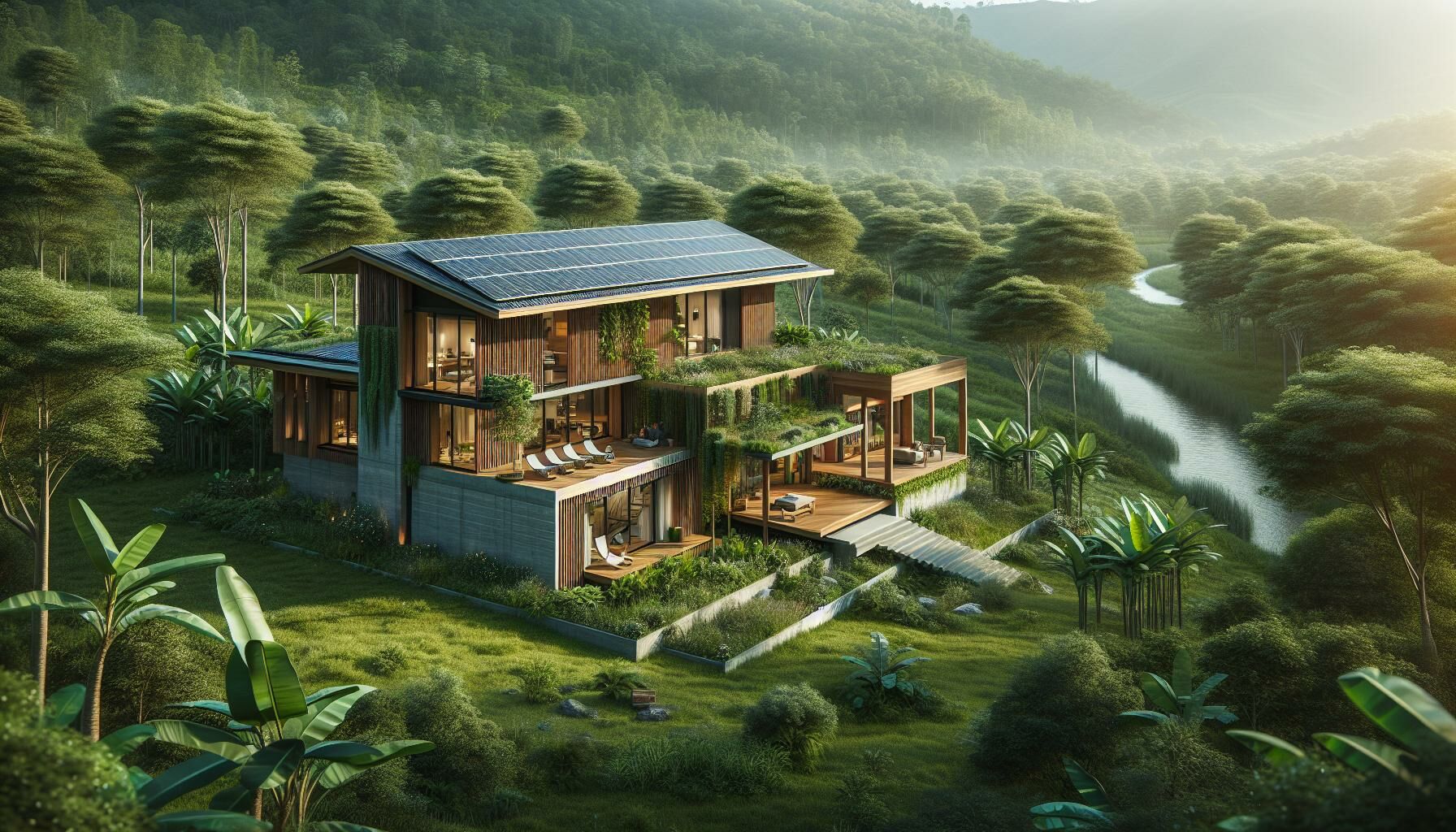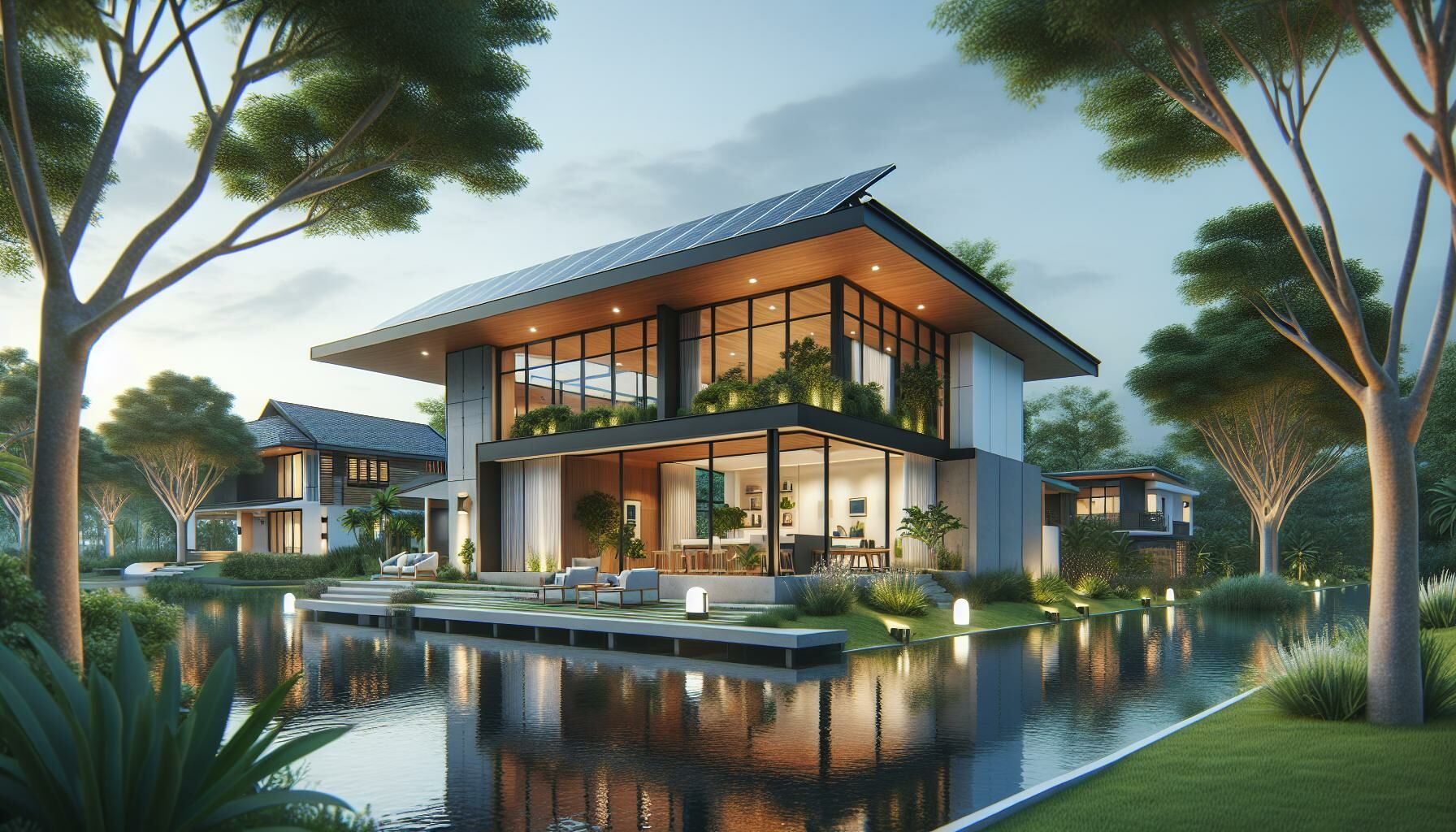Thailand is in a position where sustainable housing can significantly enhance societal conditions. With the country’s uncertain infrastructure and considerable economic disparity, a large portion of the population struggles to maintain a decent standard of living. For the middle class, homeownership is becoming increasingly unattainable due to rising financial pressures. By addressing these challenges, sustainable housing has the potential to transform and foster a more equitable society.
Technology’s role in the race to build sustainable communities
Technology’s integration is a game changer for sustainable housing in Thailand. Digital networks enhance the efficiency of resource allocation. With smart systems, homes use energy more efficiently, reducing waste and costs. For instance, solar panels and smart grids enable residents to monitor and control energy consumption.
Green technology is another crucial element. Automated systems for water recycling and waste management can be incorporated into sustainable homes, maintaining ecological balance. Green roofs and walls further contribute by improving air quality and reducing urban heat.
Digital platforms enable residents to optimise their home environment effortlessly. Mobile apps allow users to control heating, lighting and security from anywhere. This increases convenience and decreases the overall environmental footprint.
Ultimately, technology drives the future of sustainable homes. It enhances energy efficiency, reduces environmental impact and brings modern conveniences. With the right support, sustainable communities in Thailand can flourish, providing equitable living conditions for all.
Is your home sustainable?

A sustainable home prioritises both environmental impact and energy efficiency. Begin by examining the materials used in your house. Sustainable houses often utilise organic, chemical-free construction materials that reduce environmental harm. Check if your home supports self-generation of electricity, such as through solar panels. Homes with these features significantly reduce reliance on non-renewable energy sources.
Water conservation is another critical factor. Sustainable homes may incorporate rainwater harvesting systems. These systems collect and utilise rainwater for common areas and gardening, reducing water wastage. Ensure your home maximises natural light and cross-ventilation. This reduces dependency on artificial lighting and air conditioning, promoting a healthier indoor environment.
Consider the home’s insulation and energy-efficient appliances. Proper insulation maintains indoor temperature, cutting down heating and cooling needs. Appliances with energy-saving certifications contribute to lower energy consumption and utility bills. Evaluate if your home includes any smart systems. These technologies optimise energy use and enhance overall sustainability.
Adopting these practices ensures your home aligns with sustainability. Embracing green technologies and efficient designs offers long-term benefits, both environmentally and financially. Sustainable housing is not just a trend but a responsible choice for future living.
The need to buy a sustainable home in Thailand

Efficient use of energy
Eco-friendly homes in Thailand excel in energy efficiency. These homes typically use advanced technologies and smart systems to optimise energy consumption. Solar panels, for instance, harness renewable energy, reducing reliance on non-renewable resources. Energy-efficient appliances further minimise electrical usage, offering sustainable living with minimal energy waste.
Generate a lower carbon footprint
Sustainable houses significantly reduce the carbon footprint. They use renewable energy sources and incorporate eco-friendly materials, lessening environmental impact. Solar energy, rainwater harvesting, and efficient waste recycling systems ensure these homes contribute positively to environmental preservation. Lower carbon footprints lead to a cleaner, safer ecosystem.
Natural materials-building homes
Sustainable homes often use natural materials like bamboo, reclaimed wood, and recycled steel. These materials are eco-friendly and reduce the demand for new, resource-intensive products. Using local natural resources also cuts down on transportation emissions. This approach benefits both the environment and local economies.
Sustainable houses are good for your pocket
Though initial costs may seem high, sustainable homes are financially beneficial in the long run. Solar panels and energy-efficient systems lower utility bills. Reduced maintenance and operational costs also contribute to significant savings over time. Investing in a sustainable house is a wise financial decision.
Improve overall quality of life and indoor air quality
Green homes improve indoor air quality through better ventilation and the use of non-toxic materials. Enhanced air quality reduces respiratory issues and promotes overall health. Healthy living environments lead to a better quality of life, making sustainable housing a prudent choice.
Enhanced mental and physical wellness
Sustainable houses contribute to physical and mental health. Availability of natural light boosts mood and productivity. Green spaces around the house encourage outdoor activities, supporting physical wellness. Indoor air quality improvements also reduce the risk of health issues related to poor air.
Increased comfort
Sustainable homes offer exceptional comfort. Proper insulation keeps homes warm in winter and cool in summer. Smart systems maintain optimal living conditions with minimal manual intervention. Incorporating natural elements enhances the comfort and aesthetic value of these homes.
Guarantee a rise in property value
Putting your money into sustainable housing can really bump up the property value. With more and more people wanting eco-friendly homes, their worth just keeps going up. Buyers are on the lookout for homes with green features these days. So, investing in a sustainable house is a win-win; you’re helping out the planet and seeing some financial benefits too.
Easier to maintain
Sustainable homes are generally less expensive to maintain. They require fewer repairs and are built to last with durable materials. Moreover, Thailand might offer tax incentives for sustainable housing investments. This adds further financial benefits to owning a sustainable home.
Flexibility
Green homes offer design flexibility. Customisable eco-friendly features cater to individual preferences. Homeowners can choose specific sustainable technologies and materials, creating unique living spaces. Flexibility enhances the personalisation and satisfaction of owning a sustainable home.
Guides



